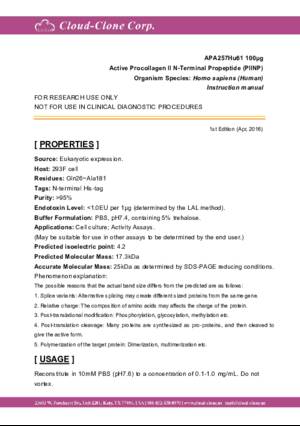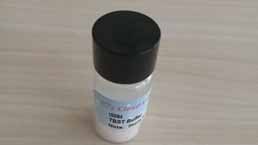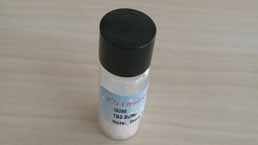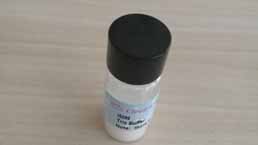Active Procollagen II N-Terminal Propeptide (PIINP)
P2NP; N-Propeptide Of Type II Procollagen; Procollagen II Amino Terminal Propeptide
- Product No.APA257Hu61
- Organism SpeciesHomo sapiens (Human) Same name, Different species.
- Buffer FormulationPBS, pH7.4, containing 0.01% SKL, 1mM DTT, 5% Trehalose and Proclin300.
- Traits Freeze-dried powder
- Purity> 95%
- Isoelectric Point4.2
- ApplicationsCell culture; Activity Assays.
- DownloadInstruction Manual
- UOM 10µg50µg 200µg 1mg 5mg
- FOB
US$ 360
US$ 900
US$ 1800
US$ 5400
US$ 13500
For more details, please contact local distributors!
ACTIVITY TEST
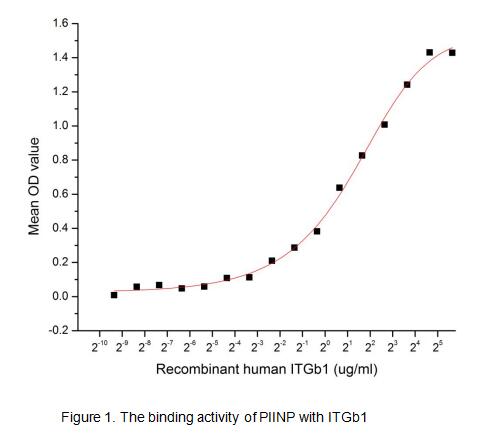
Procollagen II N-Terminal Propeptide is specific for cartilaginous tissues. It is essential for the normal embryonic development of the skeleton, for linear growth and for the ability of cartilage to resist compressive forces, which was are associated with achondrogenesis, chondrodysplasia, early onset familial osteoarthritis, Langer-Saldino achondrogenesis, SED congenita, Kniest dysplasia, Stickler syndrome type I, and spondyloepimetaphyseal dysplasia Strudwick type. A binding ELISA assay was conducted to detect the association of PIINP with ITGb1. Briefly, ITGb1 were diluted serially in PBS, with 0.01% BSA (pH 7.4). Duplicate samples of 100 ul ITGb1 were then transferred to PIINP-coated microtiter wells (2ug/ml, 100ul/well) and incubated for 1h at 37 ℃. Wells were washed with PBST and incubated for 1h with anti-ITGb1 pAb, then aspirated and washed 3 times. After incubation with HRP labelled secondary antibody, wells were aspirated and washed 5 times. With the addition of substrate solution, wells were incubated 15-25 minutes at 37℃. Finally, add 50 uL stop solution to the wells and read at 450nm immediately. The binding activity of PIINP with ITGb1 was shown in Figure 1, and this effect was in a dose dependent manner, the EC50 was approximately 2.82 ug/mL.
USAGE
Reconstitute in 10mM PBS (pH7.4) to a concentration of 0.1-1.0 mg/mL. Do not vortex.
STORAGE
Avoid repeated freeze/thaw cycles. Store at 2-8°C for one month. Aliquot and store at -80°C for 12 months.
STABILITY
The thermal stability is described by the loss rate. The loss rate was determined by accelerated thermal degradation test, that is, incubate the protein at 37°C for 48h, and no obvious degradation and precipitation were observed. The loss rate is less than 5% within the expiration date under appropriate storage condition.
GIVEAWAYS
INCREMENT SERVICES
| Magazine | Citations |
| Rheumatology | Added value of biomarkers compared with clinical parameters for the prediction of radiographic spinal progression in axial spondyloarthritis Pubmed: 30830164 |
| Catalog No. | Related products for research use of Homo sapiens (Human) Organism species | Applications (RESEARCH USE ONLY!) |
| APA257Hu61 | Active Procollagen II N-Terminal Propeptide (PIINP) | Cell culture; Activity Assays. |
| EPA257Hu62 | Eukaryotic Procollagen II N-Terminal Propeptide (PIINP) | Positive Control; Immunogen; SDS-PAGE; WB. |
| EPA257Hu61 | Eukaryotic Procollagen II N-Terminal Propeptide (PIINP) | Positive Control; Immunogen; SDS-PAGE; WB. |
| APA257Hu62 | Active Procollagen II N-Terminal Propeptide (PIINP) | Cell culture; Activity Assays. |
| SEA257Hu | ELISA Kit for Procollagen II N-Terminal Propeptide (PIINP) | Enzyme-linked immunosorbent assay for Antigen Detection. |
| LMA257Hu | Multiplex Assay Kit for Procollagen II N-Terminal Propeptide (PIINP) ,etc. by FLIA (Flow Luminescence Immunoassay) | FLIA Kit for Antigen Detection. |




